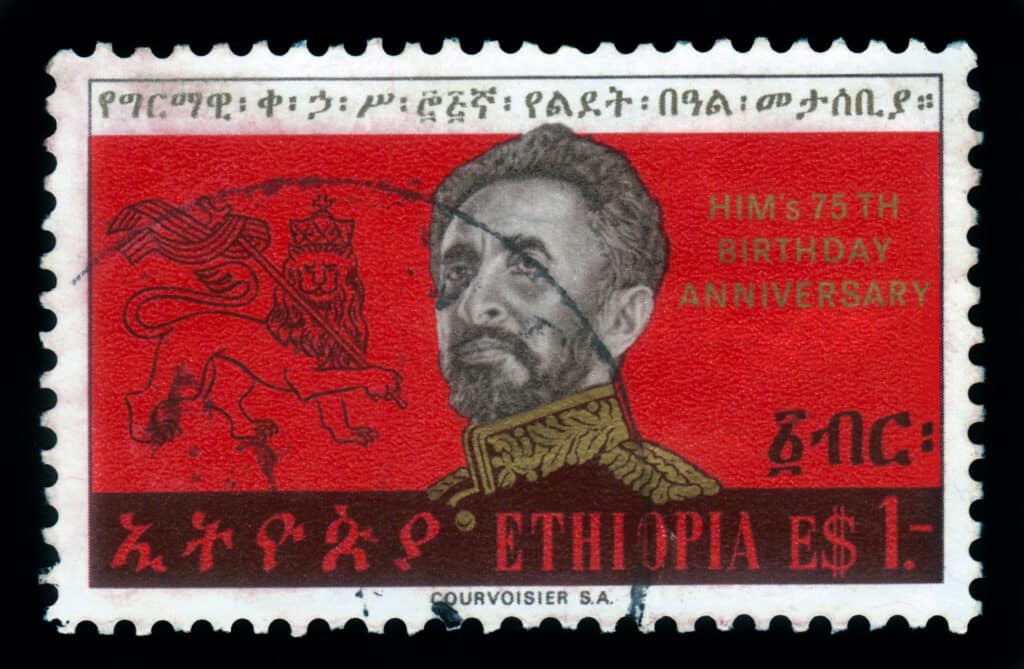The name Haile Selassie is one that will stand out to any history buff, especially if they’ve done any studying of Ethiopian history. Even reading about the titles that Selassie brandished tells enough of a story about the stature and legacy of the man, titles like “Conquering Lion of the Tribe of Judah” and “Elect of God”.
Haile Selassie is famous for being the emperor of Ethiopia and the spiritual centerpiece of Rastafarianism. During his reign, he tried to resist the efforts of Italy’s Benito Mussolini and laid the foundations for the modernization of Ethiopia.

The combination of a more modern mindset regarding world politics and a legacy inherited from his lineage turned Selassie into a well-known figure across the world. In the west, he was well-liked for his internationally friendly attitude, and across the African diaspora for the spiritual ideals that he represented.
A Holy Lineage
The mythology surrounding Selassie and his ancestry is that he is the descendant of two important figures of the Christian Old Testament, the Queen of Sheba and King Soloman. Without diving too deep into religious texts like the Book of Kings, this would have essentially made Selassie a relative of Jesus Christ.
The true roots of Haile Selassie’s lineage have been contested before, with many scholars citing the fact that there is no concrete proof documenting who Selassie’s ancestors actually were.
The main proponent of these beliefs is those who describe themselves as Rastafari. Due to the rich spiritual lineage that they apply to Selassie, they believe that not only is he related to Jesus Christ, but that he is essentially the Second Coming.
Selassie himself denied the title that was being put upon him by his spiritual followers, however, stating that he was just a man. The scale to which he had become a spiritual icon, however, meant his denial did little to put out the fire of worship that began to grow around him.
The cultural impact of Selassie still plays out today through the Rastafari. Even the name of their religion comes from a role that he had in his life, the title that he held before becoming Emperor.
The title was “Ras”, which translates roughly into “prince”, with the remainder of the religious name being taken from Selassie’s original name “Tafari Makonnen”.
The mythical component of Selassie’s legend is compounded even further when other factors are taken into consideration. One prime example of an influential factor was the prophecy-like claim by Jamaican activist Marcus Garvey, who claimed to a congregation that the day of deliverance was almost at hand and that a black king of Africa would soon be crowned.
Political Influence
The other aspect of Selassie’s legacy was his political influence and the fact that he was the first leader from the region to take a pro-international view with his politics. He toured around Europe even before he was Emperor, espousing views that were in line with the more modernistic thinking of the western world.
Talking points like his willingness and wish to abolish the slavery that was still present in Ethiopia at the time turned him into both a respected and well-liked figure in the media. This iconic status became more and more solidified as the second World War approached, due to his opinions being firmly aligned with anti-fascism.
This all came to a head when Italy finally attacked Ethiopia, sparking the Second Italo-Ethiopian War in an expansionist effort led by Benito Mussolini that furthered the Axis grip on the region.
Selassie ended up exiled, forced to stay in England for almost six years whilst he awaited an opportunity to return. When he finally did return, he was revered by his people and the rest of the world.
Legacy and Fame
Although the ending of his rule, marred with controversy about the coverups of the famine in Ethiopia, could be seen as a stain on his otherwise near-flawless legacy, history still largely remembers him as a messiah-type figure.
His politics, combined with his spiritual beliefs, elevated him to a status that was untouchable even by the oftentimes grim realities of being a monarchistic leader. That legend still lives on today, in popular culture and in the religion that he spawned.